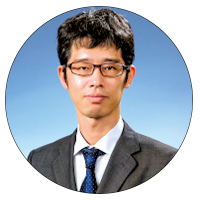Originally working at a university as a researcher in theoretical physics, in 2008 I was hired as a teacher for Ph.D. holders in Akita Prefecture, and ended up teaching at a high school.Since then, she has been teaching Mathematics and Science Tasks and Integrated Inquiry Hours.As I have been teaching for a long time, in recent years, I have been asked more and more to teach “Introduction to Inquiry” for students and training for teachers at schools in Akita Prefecture.In this article, I would like to describe the teaching of "inquiry" based on what I felt in the high school scene.
Why "inquiry"?
With the full implementation of the new Courses of Study, the conventional "comprehensive study time" has become "comprehensive inquiry time."The basic character is inherited from the conventional one, but the big difference is in the "theme setting".In the past, it was possible to work on the theme set by the school, but this time, students are required to set the theme themselves.It can be said that it is closer to the appearance of real "research".Why do we need such education now?
Witnessing the rise of artificial intelligence (AI) such as ChatGPT from around the end of 2022, there is a considerable increase in the number of people who think that they must do something about the educational process that has been aimed only at acquiring knowledge and skills. I think it was.It is clear to everyone that education is necessary to nurture human resources who can respond without being tossed about by this change and build a prosperous society.In fact, it can be said that the educational reforms that have been under discussion internationally since the end of the 1990s, especially the attention to "competency" as a new concept of academic ability, anticipated the advent of such a society and were discussed in advance. I guess.This trend is strongly reflected in the current Course of Study and the “Comprehensive Inquiry Time”.
So, what are the qualities and abilities required for education in this age of rapid change?In my view, it is the qualities and abilities of a doctor.And that ability is not the knowledge of a specialized field, but the ability to create new knowledge.In order to be recognized as a doctorate, it is necessary to conduct original (or novel) research that is the first of its kind in the world.Doctoral course students hone their ability to conduct novel research through rigorous debates and paper submissions in laboratories and at academic conferences.In other words, a PhD is a person who excels in "the ability to create new knowledge."
This ability is considered to be important in a rapidly changing society.What should employees do if the cash register job is gone?How to deal with AI being used for homework?As with any PhD research, you need to collect data, form hypotheses, and come up with new countermeasures.
Of course, the “Comprehensive Inquiry Time” introduced this time is also designed based on such a concept.In the course of study commentary, it is written in a fairly in-depth expression that "discover the issues that are integral and inseparable from one's own way of life".It is not enough to simply discover a problem on your own. During high school, when you are a sensitive period that will affect your future life, you will encounter a problem that will become your life's work during the "Comprehensive Inquiry Time". I want you to pursue it.It can be read that such a wish is included.It is a very rare and passionate text for a course of study commentary.We highly recommend that you read it.
high school content
Now, you are a new teacher who will start teaching.I learned about the significance of the "comprehensive inquiry time" mentioned above in the teacher training course and the initial training.I resonate with the high ideals envisioned by the Ministry of Education, Culture, Sports, Science and Technology, and am excited to be able to lead the "Comprehensive Inquiry Time."When starting research activities, you can't do anything unless you decide on a theme.First of all, without providing any information from the school side, we decided to ask the students, "What theme do you want to work on in your research activities?"
The students seem to be having a hard time.In general subjects, the emphasis is placed on how well students can handle given tasks, and students have been training for that.Then, out of the blue, I was told, "Anything is fine, come up with a theme."At school, they are bound by rules and textbooks, and while they feel free to do so, they struggle when asked to do so.
Since nothing came out of it, I instructed the students to write down what they really want to do and what they are interested in, rather than being bound by one thing or another, as this is a class at school.I felt that the teacher had managed to draw out his true intentions, but I was appalled by the themes that emerged.
• Why KPOP is popular all over the world
• Favorite type of opposite sex
• Do you prefer miso ramen or soy sauce ramen?
• To win against serious players in ○○ (○○ is the name of the game)
• How not to fall asleep in class
• Is there a relationship between blood type and personality?
• Can Doraemon's secret tool be realized?
• science fiction
There is a big gap between what the course of study says is, "a subject that is integral and inseparable from one's way of being and one's way of life."On the other hand, there are also themes that seem to be in line with the aim of this class.
• How to stop the declining birthrate and aging population
• To revitalize ○○ city
• To prevent global warming
• How to improve gender inequality
The theme itself is appropriate, but it lacks concrete content and does not convey what you want to explore and how.Some students were not really interested in it, but I could see that they were just writing about themes that adults wanted them to do.In this state, no matter how much I instruct the students to "act independently," I don't feel like progressing at all.I held several classes after that, but the themes that the students were thinking about did not deepen, and the time just flew by.
An incident that happened when I was teaching theme setting left an impression on me.In the above-mentioned situation, I gave instructions that "no love, no food" as the theme to choose for the time being.Then, a student said to me, "Teacher, if we take food and the opposite sex from us high school students, what will be left?"I remembered when I was a high school student, and I couldn't help but nod.
Typology of themes
Over the years of teaching inquiry, I have developed a sense of the characteristics of the first themes my students come up with.There are some students who propose sharp themes from their own perspectives, but they are very few in number.Specifically, the characteristics are
• Entertainment (music, movies, youtube, games)
• Senses, Psychology, Love, Friendship
• Something scientific (Doraemon, health equipment, health food, blood type)
etc.I notice that all of them are popular as objects of consumption.It is difficult to come up with a theme that is likely to lead to the creation of knowledge (academics) or the creation of value (business).Of course.The consumption trends of high school students are extremely important for companies and managers in the sense that they form trends.Therefore, the media exposed to high school students is flooded with interesting content to maximize their interest. Even if you look at youtube or tiktok, you will find something very interesting, and in that sense it is very valuable, but it is only for increasing consumption.It is the exact opposite of the goal of inquiry, which is to "generate new knowledge."So what do we do?What can be done to encourage high school students to focus on "creation" rather than "consumption" and toward a prosperous future? (Continued to Part 2)

Akita Prefectural Yokote High School Teacher
Masashi Zeze

